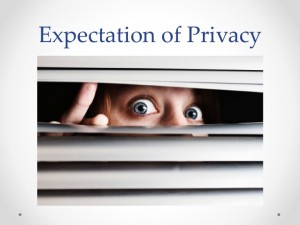Expectation of privacy ?

January 21, 2018
Everywhere we go we take our cellphones. Our cellphones contain so much knowledge about us including what we do, and where we are, and who we text (etc)… Our cellphones even track our every move everyday. This happens because our cell phones ping off our location every time we are near a cell phone tower. This location information is being transmitted to our cell phone companies. Company’s keep and retain this information to better their business. This enables them to track customer usage patters so they can understand how their company is doing.
The controversial topic
The government is able to obtain your digital information. The information that they can obtain can range from location information to emails… The main one we are focused on today will be location. The government can seek your location history from your cell phone company at any time and many think that this is intrusive and it violates the 4th Amendment. The Fourth amendment protects persons,houses,papers, and effects from unreasonable searches and seizures, and requires probable cause.
The Robbery Case
Light has been shined on this controversial topic ever since a set of 9 armed robberies were committed at radio shack,and T-mobile in Michigan and Ohio. One of the robbers was Timothy Ivory Carpenter. Carpenter gave the FBI his and his accomplices phone numbers. The government then pursued a court order under the “Stored Communications Act”to obtain the location information that placed Carpenter in the vicinity of the robberies. The “Stored Communications Act” allows the government to obtain electronic information from cell phone company’s under certain circumstances. Carpenter and his attorney moved to suppress this GPS information from the trial because “a warrant was needed”. The defense argued that the fourth amendment required the government to pursue a search warrant to get this location information, because Carpenter had an” expectation of privacy” when it came to his location information.
What stance do the courts take ?
There is a split decision on whether or not a warrant is needed for the government to obtain location information from the company. Location is not private because everyone can tell where you are at. Therefore there is no expectation of privacy when it comes to your location. However many feel that the government should not be able to get a hold of these records because it is intrusive and no one expects their information to be turned over to the government.The Supreme Court is currently overseeing the case.
Living in the technology revolved world that we live in today, do you have an “expectation of privacy” when it comes to your location information?

